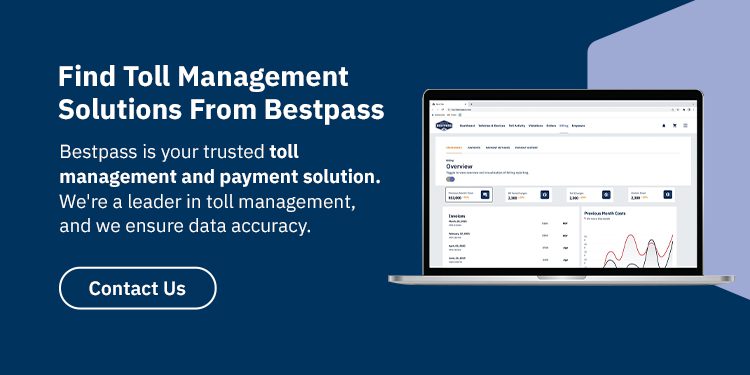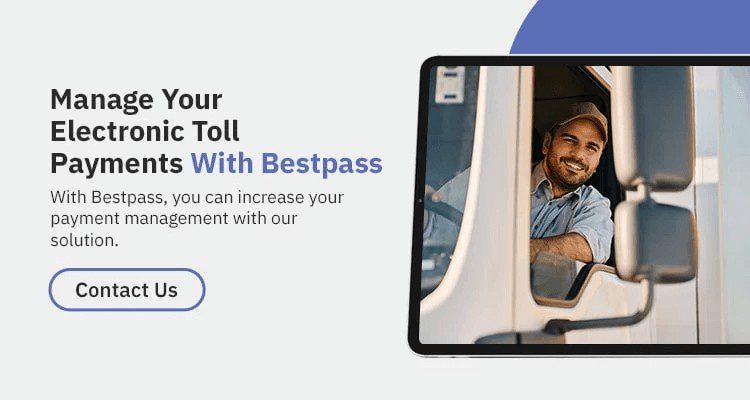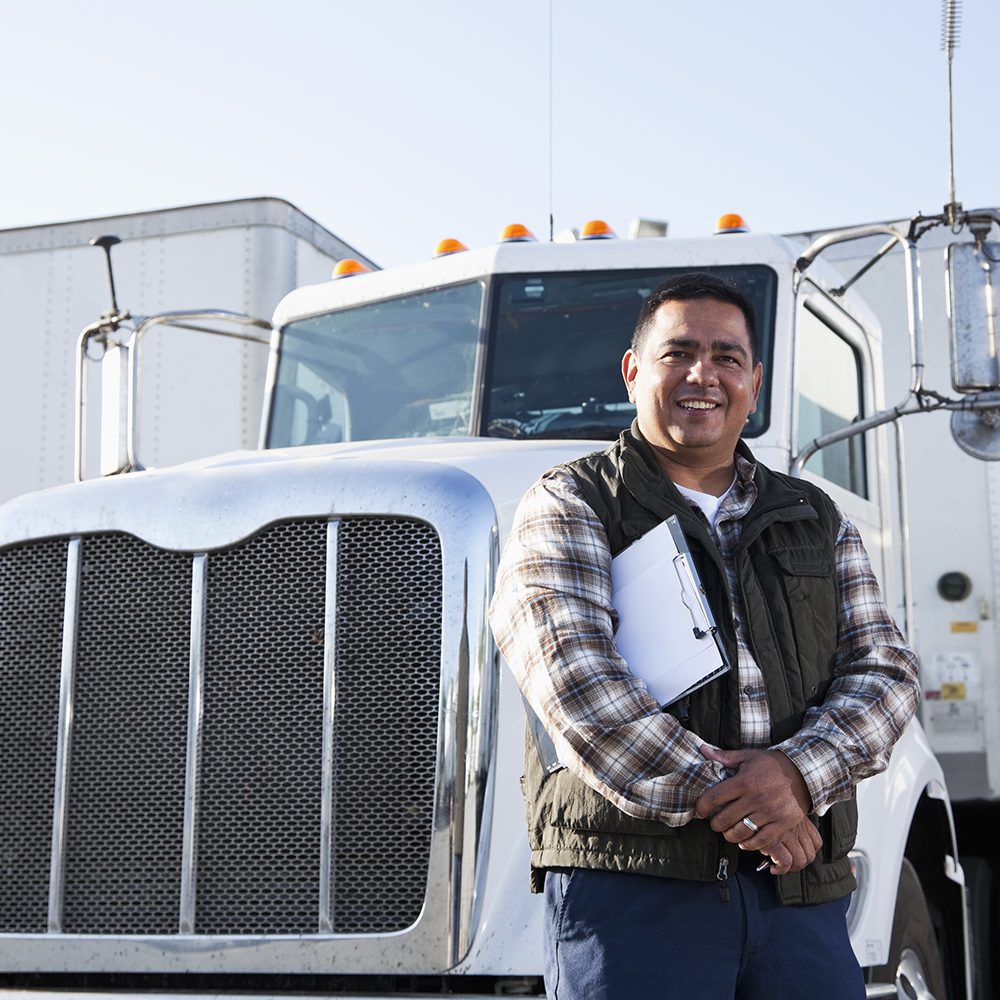Tag: EZ-pass
What Is Toll-by-Plate?

What Is Toll-by-Plate?
As electronic toll collection has grown in popularity, toll-by-plate charges have increased for many businesses and drivers. Delayed billing and additional administrative tasks impact many companies’ ability to keep accurate spending records while maintaining the necessary paperwork to ensure they receive the correct charges for the corresponding routes.
Understanding toll-by-plate is essential for business operations if your fleet regularly relies on toll roads, tunnels, bridges and similar facilities. In this guide, you can find comprehensive information about toll-by-plate services and discover resources for managing plate transactions and exposure.
What Is Toll-by-Plate Tolling Service?
Toll-by-plate is a charge you receive if the toll booth misreads your vehicle’s transponder or if the transponder is not in your vehicle when you go through the toll booth. If you frequently receive toll-by-plate charges, you may not have mounted your transponder correctly or need to purchase a new one.
Toll-by-plate services let drivers continue driving rather than stopping at the toll booth to pay their fees. This system offers driving convenience but can result in a lot of paperwork for businesses that receive them frequently. Receiving a toll invoice can take days or weeks, making it challenging to keep track of driving dates, funding and routes to ensure the charge is correct.
How Does Toll-by-Plate Work?
Cashless tolling is an innovative solution for commercial and residential drivers that takes a picture of the license plate as drivers continue through a booth or toll gantry. With this toll collection option, drivers can continue their routes while skipping long lines, minimizing air pollution, avoiding congested traffic and maintaining their safety on the road.
Drivers without a transponder or other active toll passes can drive through a toll booth or gantry without stopping. The toll-by-plate service is a backup system to ensure all vehicles receive toll charges.
As a driver travels through a gate or gantry, mounted cameras will capture an image of the license plate and the registered car owner will receive a toll bill in the mail in the following days. Some states offer lower toll fees for drivers with a transponder because the additional processes to identify vehicle owners causes a price increase. If your drivers frequently use toll roads, tunnels or bridges, investing in transponders or similar valid passes could reduce business costs while saving time.
Three toll systems in the United States can affect the toll charge you receive:
- Barrier system: Mainline toll booths and ramp tolls have fixed rates every time a driver travels through them.
- Ticket system: Ticket systems charge drivers depending on their entrance and exit on the toll road. This system is similar to a subway station, and the total charge likely differs for every route.
- Distance-based system: Drivers will pay tolls based on how far they travel on a specific road when passing through a distance-based system.
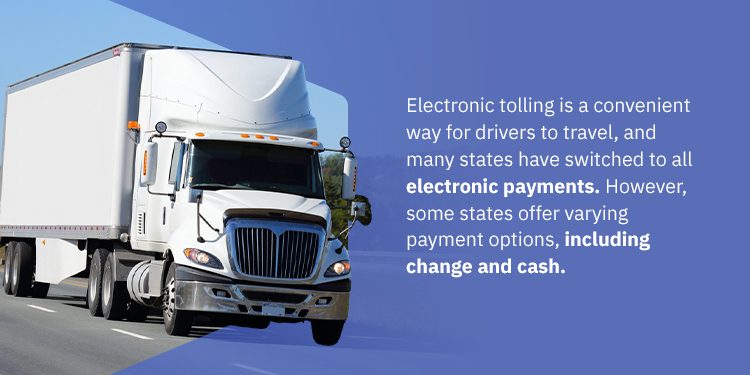
Are All Tolls Cashless?
Electronic tolling is a convenient way for drivers to travel, and many states have switched to all electronic payments. However, some states offer varying payment options, including change and cash. Many tolls offer a variety of ways to pay the fees, including with a credit card, prepaid card, transponder, cash or license plate. Additionally, you can typically pay your toll invoice in cash if you travel on a toll road without a valid toll pass.
What Does Toll-by-Plate Mean for Fleets?
Toll-by-plate systems can significantly impact fleets, regardless of their size. The additional wait time to receive an invoice and keeping route and driver information can quickly create many administrative tasks that take time, effort and resources to resolve. Additionally, each tolling authority has varying regulations for service, which increase the complexity of fleet operations.
Maintaining accurate vehicle lists, such as license plates, is vital for ensuring each of your fleet vehicles and operation. Additional complications can occur when renting or leasing equipment or transferring plates from one owner to another. Larger fleets that routinely replace outdated equipment with newer models can experience a vast increase in administrative tasks, making it challenging to maintain accurate financial information.
Furthermore, many large fleets have numerous trailers for each tractor. Although some tolling authorities will accept trailer plates, others will not. Many toll readers capture the license plate on the back of a vehicle, so many plate transactions can occur when reading the trailer plate rather than the tractor plate. If your business leases or rents trailers, you can experience an additional delay because it can become challenging to determine who is responsible for the toll charge.
How to Handle Unknown Toll-by-Plate Invoices
Many fleets receive mystery toll-by-plate invoices for a plate they never owned or a vehicle the company no longer holds. Disputing the charge and ensuring this mistake doesn’t reoccur is essential for keeping track of your financials and ensuring resources are only dedicated to necessary accounts.
You’re likely to receive an invoice because the DMV has information that highlights you as the registered vehicle owner. If this plate is one that you once owned but has since sold, you will need to provide sale information describing the plate and vehicle. You will also need to provide data about the plate submission date to show that this process occurred before the toll transaction date.
If you received an invoice for a plate you never owned, you would need to request a title abstract or registration. These documents show that your fleet never owned the plate and provide accurate information about the registration history.
Find Toll Management Solutions From Bestpass
Fleets can internally manage toll-by-plate strategies, but this process requires extensive administrative tasks and forces you to obtain information about all equipment and transponders throughout the fleet. Rather than relying on your staff to gain comprehensive knowledge about each toll authority and their best practices, you can depend on Bestpass to deliver high-quality solutions that save you time and money.
Bestpass is your trusted toll management and payment solution. We’re a leader in toll management, and we ensure data accuracy. We partner with 50+ tolling authorities to save fleets time and money by handling their tolling administrative tasks.
As a premier option for commercial fleets through Canada and the United States, we bridge the gap between fleets and tolling authorities. We remove the tolling complexity so you can focus on your organization and operations. Whether you have a six-vehicle fleet or use 6,000 trucks to perform your business operations, we’ve got you covered.
With Bestpass, you can find a one-stop solution to toll management without lifting a finger. Contact us for more information about our services and learn how we can save you time and money. We’d love to hear from you.
Learn More About Bestpass and Speak to a Tolling Specialist Today
If you want to experience effortless and convienient service fleet toll reporting for your company, look no further than Bestpass. We offer the best toll pass for service fleets, providing a platform that makes it easy to understand bills and save time and money. When you sign on with us, you can expect fast implementation, toll discounts and comprehensive coverage.
What Happens if My Transponder is Stolen?

What Happens if My Transponder is Stolen?
When it comes to managing tolls, you most likely are thinking about how you pay your tolls and manage them. You may not have considered that someone may attempt to remove the transponder from your vehicle while you are away. If not taken care of promptly, this could result in thousands of dollars in losses. In 2016, one stolen E-ZPass transponder in Pennsylvania racked up more than $11,000 in fraudulent charges before its real owner discovered the crime. It is easy to believe that this could not happen to you. However, the act of stealing transponders happens more often than you may think and is something you should be aware of.
We have seen an increase in customers reporting transponder theft, and we want you to be aware of the steps you can take to ensure your transponder stays safe on the road and doesn’t fall into the wrong hands.
How does this happen?
Often perpetrators will target unlocked vehicles, so they do not have to break in. Once inside the vehicle, a thief simply steals the transponder and replaces it with a non-operating fake one. The perpetrator accomplishes this by swapping the label for another transponder that is often inactive or out of service.
The owner may not realize the device has been swapped because it appears to be the same device. The internal RFID (radio frequency identification) is used by the tolling authority to read the device and toll charges on the stolen device will go to the fleet’s account. This means that the vehicle with the inactive or out-of-service device will incur toll violations and the fleet will be paying charges from the stolen transponder.
In the event you are incurring violations that are not yours or suspect any wrongdoing, we recommend contact/ing the authorities once you confirm that your device was stolen. If you are a Bestpass customer, we will work with the tolling authorities on your behalf to ensure the charges are correct, and you don’t incur future incorrect violations.
Bestpass also offers a violation payment service that makes it easy to process toll violations you may incur and identify when your vehicle is consistently receiving them. This can help identify if a transponder has been stolen.
How can you keep your transponders/activity safe?
The best way to ensure your devices stay safe is to either remove the transponder from the windshield or lock it in the vehicle cab when no one is present. As an added precaution, be sure to monitor your toll activity regularly. If you notice charges of tolls for roads that are not a part of your regular travel patterns, you should investigate it immediately. If you are Bestpass customer, you can contact/ customer support to help identify the next steps.
At Bestpass, we provide an alert system in our online portal. This feature allows our customers to set days and times that devices should be in use, helping alert fleets to activity outside of their normal area and travel patterns.
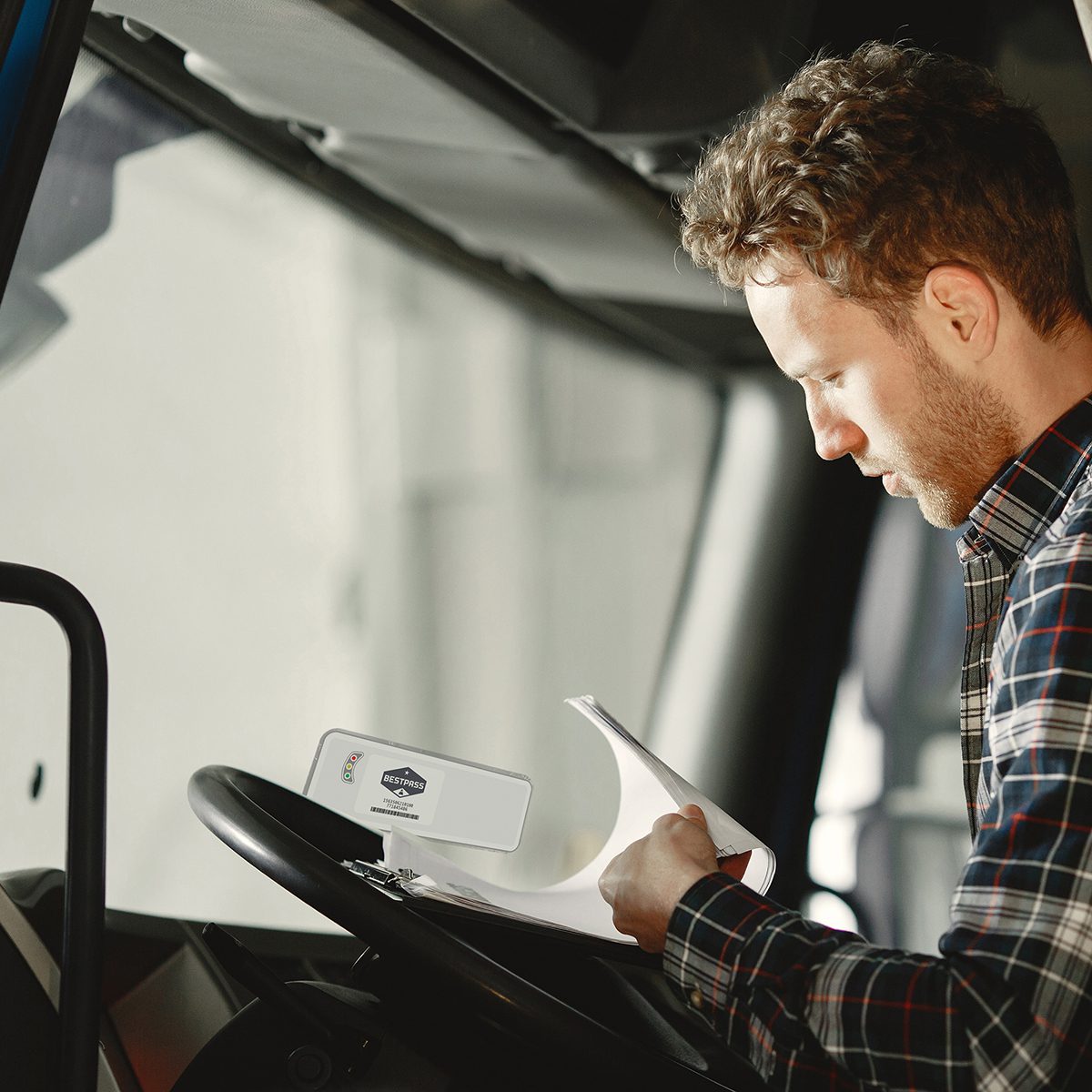
What to do if you suspect wrongdoing?
If you suspect any fraudulent activity, immediately deactivate the tag and forward it to the issuing agency to confirm the RFID. If you are a Bestpass customer, you’ll return the tag to us, and we will work with the issuing agency to confirm the RFID.
Once you have determined that the information is mismatched, you will need to file a police report with your local authority so that they can subpoena transaction records to see if they can acquire any images that prove your case.
Based on the amount of the transaction, your local authorities will determine the best way to pursue it. We do not advise disputing the charges on your card for the suspected illegal toll activity, as this could have adverse implication on your existing accounts. Once the process is resolved by the authorities with the issuing agency, the goal is to get credit for this toll activity.
Are there other ways my information can be stolen?
Another tactic perpetrators will use to gather your personal information is using a phishing scam. Victims of this scam will receive an email appearing to be from Bestpass or a tolling agency. The email will use realistic logos and threatening language to inform you that you owe money for driving on a toll road without paying.
These emails also contain a “hook” in the form of a link to a website where you can view and take care of your supposed fine without fear of “further legal action” against you.
If you receive an email of this nature, it is not from Bestpass or your tolling agency. If you click on the link in this email, the perpetrator running the scam will try to put malware on your computer. By providing the perpetrator with any of your personal information, they will often use it to steal your identity. This goes beyond transponder information and can directly threaten your money, credit rating, and personal security.
How can I make sure this doesn’t happen to me?
The Federal Trade Commission (FTC) recommends that if you do find a suspicious email in your inbox, you should not click on any links in the message or reply to it. If you think the email may be from Bestpass or a tolling agency, please contact/ the customer service team directly.
To help stay safe from these dangerous scams, the FTC advises you should:
- Never click on any links in emails unless you are certain you know or do business with the sender.
- Never reply to any emails that ask for personal or financial information. Even if the sender is legitimate, email is not a secure way to send such information. In fact, it is never a good idea to include things like your Social Security number or bank account information in any email message, including those you send.
- Always keep your computer security software current and active.
If you think you might have received a phishing scam email or be a victim of one, you can:
- Forward the suspect email to spam@uce.gov and to the company impersonated in the email.
- File an official complaint with the Federal Trade Commission’s online FTC Complain Assistant.
Transponder theft and email phishing are only two of many ways perpetrators may try to steal your personal information. Bestpass wants to make sure you stay safe and are aware of the best practices to protect your information on the road.
Request a Demo of Our Toll Management Software Today!
Not sure which Bestpass plan is right for you? Our tolling specialists are here to help. They can identify the right transponder strategy to save you the most money and time.
What Are Toll Transponders and How Do They Work?

What Are Toll Transponders and How Do They Work?
Jump to: What Are Toll Transponders? | How do Toll Transponders Work? | Benefits of Toll Transponders | What is a Toll Violation?
On the road, your fleet can pay tolls in various ways. The most traditional way is with cash, but your drivers will have to keep receipts, and your accounting teams will need to calculate reimbursements. Technology and cameras at collection points let you link your license plates to a prepaid account, but it may take some time for toll authorities to pair the plate with your information.
Toll transponders make connecting your payment information with toll authorities easy, letting you better track charges and identify miscalculations. But how does electronic tolling work? Understanding the method thoroughly and its benefits can help you determine whether it will best suit your company and fleet.
What is a Transponder for Tolls?
Toll transponders, also known as toll tags, are wireless transmitters that attach to your truck and send a radio signal to tolls. They connect toll authorities with your payment information, allowing collectors to charge your account efficiently and provide you with essential transaction data. When you need to manage large fleets of trucks, transponders can be a great tool to track and store toll information.
Toll transponders have many names and types. You can also call them toll tags, an electronic toll pass or by the transponder’s brand, like E-ZPass. Most toll transponders sit on your dashboard or stick to your windshield, so toll authorities can easily scan them. However, if you have a car-hauler or your windshield is blocked, you can also get an exterior toll tag that attaches to your license plate or roof.
How Does a Toll Transponder Work?
Toll passes function with electronic toll collection (ECT) systems, which are a group of transmitters, scanners and cameras. Lasers scan the area for oncoming traffic and alert the other tools in the system when one of your trucks approaches the tolling point. Readers scan for the transponders, which give off a radio transmission the readers can process. Cameras fixed to both sides of the checkpoint will take pictures of your front and back plates. Lastly, ground sensors will count how many axels the vehicle has.
Along with your account information, scanners will send the following data to tolling authorities:
- Date and time
- Location
- The number of axels
These factors will determine the toll cost. Many toll authorities will adjust rates depending on the time and season to accommodate heavier traffic. Larger vehicles, like a truck, might also have varied prices.
The scanners link to tolling authority networks, which process your transponder data and attach it to an existing account. Once connected, it will charge the toll amount automatically. Your account will let you view and manage your payments online, making it more efficient than other tolling methods.
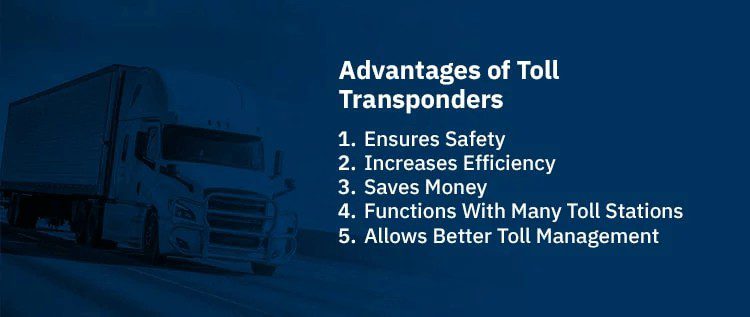
Advantages of Toll Transponders
While companies can use multiple methods to pay tolls, transponders have many benefits. When determining the right payment option for your company, learning the benefits of toll passes can help.
1. Ensures Safety
Accidents are common around toll booths. If paying with cash, drivers might turn their attention away from the road to find or sort money. Lines can move slowly, causing drivers to switch lanes suddenly to quicken the process. Electronic tolling is fast and hands-free, allowing drivers to pass through checkpoints with more care for other motorists around them.
2. Increases Efficiency
Toll transponders are great for increasing toll payment efficiency. Without the need to fumble for cash, your drivers can move quickly through checkpoints. Further, many tolls designate lanes for electronic tolling, increasing traffic flow by separating those who need to use cash.
Some tolling authorities are moving away from stopping to pay entirely. Instead, drivers will pass checkpoints at highway speeds, and toll technology will record vehicle and account information. This system can further increase driving efficiency by reducing the stops your drivers take.
3. Saves Money
Toll rates depend on many factors, and some toll authorities include your chosen payment methods. As more authorities try to switch to electronic processes, they offer discounts and cheaper rates to entice motorists to use options like toll transponders over cash or mail options. Discounts can save up over time, helping you cut your spending. Further, you can avoid hefty processing fees that come with other choices.
4. Functions With Many Toll Stations
Tolling work varies by state and locality, with each area prioritizing different factors. Toll transponders are compatible with all toll types. Whether drivers have to stop at tolls or drive underneath checkpoints, your fleet can travel everywhere it needs without surprises. Transponders provide a more widespread solution than other options.
5. Allows Better Toll Management
Because payments process electronically, your accounting team can access, check and file payments. When you use cash, you have to count on your drivers to save receipts and reimburse when necessary. Paying by mail causes accounting to wait for toll authorities to process and send dues. You can more efficiently manage your account and check payments for correct charges.
What Is a Tolling Violation?
Tolling violations occur when someone goes through a toll station without fully paying. Violations can include underpaying or passing without paying. Tolling violations are often caused by transponder problems, like having an expired, invalid or broken one. Another example of tolling violations include not having enough cash when reaching the terminal.
You can avoid most tolling violations by linking your license plate to a prepaid account. Because most tolling checkpoints document your transponder information and license plate, your license plate account can act as a backup plan. You can bypass a tolling violation if you have money in this account.
If you don’t have your trucks linked to a prepaid license plate account, the tolling authorities will send a payment request to the address registered with that plate. Because they had to search the plate and send you the invoice, the cost will likely include a processing fee. You might also have a time limit to submit the payment without further penalties.
Manage Your Electronic Toll Payments With Bestpass
When you want a safe and easy payment method for your drivers, electronic tolling is an excellent choice. Your drivers can pass efficiently through tolling points, and your accounting teams can access the transaction information as tolling authorities submit them.
With Bestpass, you can increase your payment management with our solution. Bestpass aims to help you save money on the road by working with tolling authorities to find discounts and make electronic payments accessible. We will work with you to pair your fleet with the right transponders from major providers, including the Complete Pass. You can ensure your drivers will have coverage at every toll. Our system makes payment history more visible to accounting teams, helping them better understand toll patterns and quickly identify mistakes.
Request a Demo of Our Toll Management Software Today!
Not sure which Bestpass plan is right for you? Our tolling specialists are here to help. They can identify the right transponder strategy to save you the most money and time.


